-

Future is bright
“We have seen a positive public sentiment towards the new energy paradigm established by the e-mobility discourse, with more citizens transitioning from ICEs to EVs,” affirms Gill. “We anticipate that 2022 will be much better and hope that the government will bring in some new measures to fuel growth. In the next four to five years, we will see India leading the way in e-mobility.”
To further support the industry and encourage people to use EVs, the ministry of road transport & highways (MoRTH) has issued a draft notification proposing that battery-operated vehicles be exempted from paying fees for new or renewed registration certificates. The latest development is a part of the multiple initiatives undertaken by the government to boost electric vehicle sales in the country. The ministry has sought comments from the general public and all stakeholders within a period of 30 days from the date of issuance of this draft notification. The proposed rule will apply to all battery-operated vehicles, including two-, three- and four-wheelers.
High expectations
Emkay Global Financial Services recently organised its first ‘Electric Vehicle’ conference featuring eminent speakers and stakeholders from the entire EV value chain. The event witnessed the participation of over 700 speakers and observers. The expectation of EV adoption is high and now the debate has shifted from ‘when’ to ‘how soon’. The key issues discussed were batteries, charging infrastructure, components, localisation, FAME-2, PLI and government EV policies, which would help promote EV demand. The recent moves of firms across the value-chain on product line-ups and investment as well as their resolve to go ‘all electric’ have notably reset the expectations regarding the pace of EV adoption.
-
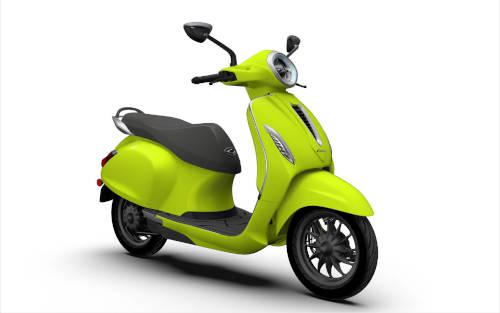
The famous Chetak from Bajaj is now in an electric avatar
Two-wheelers
Hero Electric has been at the forefront of the electric two-wheeler industry for over 13 years. The company’s manufacturing unit is in Ludhiana, with two logistic facilities in Patna and Hosur. They have a lot of firsts in the industry ranging from the development and launch of the first lithium-ion based electric scooter in India to the introduction of the unique concept of charging stations for anywhere-everywhere charging. They offer 12 models with a diverse range of e-bikes to choose from. Further, with a policy conducive to localisation, they predict that the market over the next decade will hit $206 billion and rapidly grow with more adoption across all centres in the country.
In the last year, the industry sold over 150,000 bikes, with Hero selling over 53,000 units. They also set a target to sell 500,000-700,000 units over the next five years. “Our products are designed indigenously at our plant in Ludhiana,” says Gill. “However, there are some components, like lithium-ion battery cells etc. which are still imported as they are currently not being manufactured in India. The road ahead for EVs is bright as the demand continues to grow despite unprecedented challenges like Covid-19.”
Hero MotoCorp has announced that it will be entering the electric vehicle market. According to company officials, they are bullish on EVs and working on the new model to be launched in 2022. The company will use its R&D centres in Jaipur and Germany to develop its products. It recently tied up with Taiwan-based Gogoro to bring its battery swapping platform to India.
Founded in 2013 by Tarun Mehta and Swapnil Jain, Ather Energy is one of India’s first ‘intelligent electric vehicle’ manufacturers. Ather launched its first scooter – Ather 450 – in 2018, followed by the new offerings Ather 450x and 450 Plus in 2020 at its new plant in Hosur. It has features like Bluetooth connectivity, Google Map navigation, onboard diagnostics, and other unique features like over-the-air updates, auto indicator off, and guide-me-home lights. To create electric vehicles and a supporting ecosystem, the company established Ather Grid, a public fast-charging network for the electric vehicle community.
With more than 130 charging stations across 18 cities in India, Ather Grid is one of the largest fast-charging networks for electric vehicles in the country. The application allows all EV owners to check the availability of charging points and their locations. Over the years, Ather Energy has raised an investment of $145 million through several series of funding. The latest round of funding (Series D) was led by Sachin Bansal’s investment of $23 million and $12 million by Hero MotoCorp in November 2020.
As part of its diversification strategy, Greaves Cotton entered the electric mobility business with the acquisition of the electric two-wheeler company Ampere Electric in 2018. Ampere has a background of 13 years in the EV segment. It has a presence in both B2C and B2B segments with 80,000+ customers. Apart from electric scooters, the company also supplies industrial electric vehicles for cargo movement within the factory premises. Under the umbrella of Ampere Electric, Greaves Cotton acquired electric three-wheeler brand Ele in 2020 to further strengthen its position in the country.
-
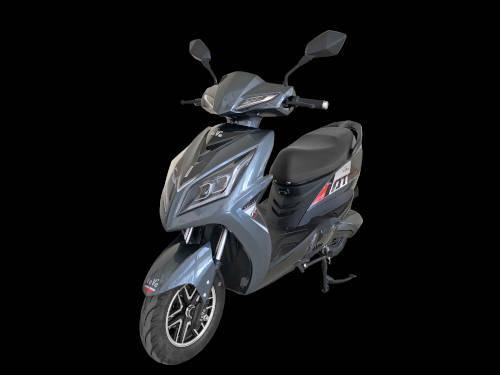
EeVe offers high-speed models in both scooter and bike segments
Ampere has invested in the new facility in Ranipet which is being developed with an investment of Rs700 crore. Once ready, this will have the potential to start making up to one million units per annum. Ampere’s materials are sourced locally with a strong supply chain network across India. The next three to five years will see good growth in the demand for EVs in the country. Many companies are in the process of setting up manufacturing hubs in India, which will create a huge domestic opportunity and reduce our dependence on imported products.
Okinawa Autotech was set up in 2015 and was the first Indian company to get a FAME II subsidy from the government. In 2020, despite dealing with the pandemic, they sold 30,930 units and this year, they are planning to grow the numbers threefold. “My entire life has been dedicated to working in the two-wheeler industry.
With 20 years of experience and expertise in automobiles, I took a step towards conducting in-depth research on EVs in India and creating a sustainable brand for many future generations to come,” says Jeetender Sharma, MD & founder, Okinawa. “For the investments, we started by convincing the supply chains about the future of electric vehicles and investing in the future of vehicles. We also had to make the banks understand the reliability of electric vehicles so that once they start financing them, it will increase their business,” adds Sharma.
About 92 per cent of materials are sourced from Indian local suppliers. A recent report by KPMG and CII, Shifting Gears: the evolving electric vehicle landscape in India, clearly states that India is expected to have 25-35 per cent two-wheeler EVs and 65-75 per cent, three-wheeler EVs on road by 2030.
Ola Electric has commenced construction of its two-wheeler factory on its 500-acre site. The company announced a Rs2,400 crore MoU with the Tamil Nadu government in December 2020 and land acquisition in January this year. The plant will have an initial capacity of two million units a year in phase 1 and will serve as the company’s global manufacturing hub for its range of electric two-wheelers across India and international markets.
The famous Chetak from Bajaj is now in an electric avatar. This is their only electric model currently available in the market. It has all the latest tech features. Chetak is a connected scooter with a dedicated app that allows owners to receive notifications in the event of unauthorised access or an accident. It is available in two trim options – Urbane and Premium – in six different colours.
Bajaj Auto plans to enter the electric three-wheeler segment in 2022. Bajaj Chetak’s rival in this segment is TVS iQube. It was first launched in Bengaluru and now the company is expanding to other cities. Like Chetak, the iQube has many tech-oriented features. Another interesting feature in the iQube is Q-Park Assist, which allows the rider to reverse into a parking lot – a feature usually available only in cars.
-
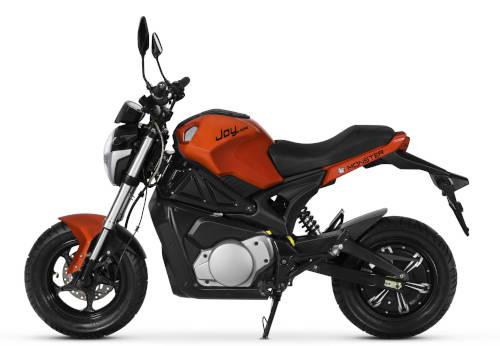
The RattanIndia-backed Revolt is the market leader in EV bikes in the country with more than 3,500 bikes on the road clocking over 2 crore km cumulatively. They commenced sales in 2019 with a vision of democratising clean commutes using next-gen mobility solutions and a mission to provide green electric mobility. Revolt has two EV bike models – RV400 and RV300. The bike can be operated through the MyRevolt app, which offers connectivity features. Revolt was founded by Rahul Sharma, co-founder of Micromax, in 2017.
Although the company witnessed keen investor interest early on from a slew of PE Funds and strategic investors, they chose to partner with RattanIndia. The company is one of the largest listed EV businesses in India with a market cap of Rs3,000 crore. The products have been completely designed in-house based on a platform approach which gives the designer added flexibility to make modular and scalable products.
The assembly plant is based out of Manesar and has an annual capacity of 100,000 units. It will achieve 100 per cent localisation by 2022. “India is the world’s largest two-wheeler market and it is being majorly disrupted by EVs as we speak. The value proposition of EVs is far too good and superior to be missed by customers and we shall see a very rapid transition towards EV two-wheelers in India”, says Rajiv Rattan, chairman, Revolt and RattanIndia.
BattRE Electric Mobility, a technology-driven innovative start-up sold its first scooter in July 2019. Since its inception, the company has launched four models of e-scooters and built an EV ecosystem such as affordable recharging stations, roadside assistance, extended warranties, thus making e-scooters accessible to everyone.
“We want to keep working hard and keep evolving to increase our efficiency and meet the demands of the customers,” says Nishchal Chaudhary, founder, BattRE. “With a new factory coming up, we are looking at doubling our production capacity. We are working on an electric bike and this is going to be India’s first 100 per cent EV made in India. We have grown by 250 per cent last year in spite of Covid and are seeing a huge spurt in the EV space.”
Wardwizard Innovations and Mobility is India’s first company in the EVs sector to be listed on the Bombay Stock Exchange. The company makes electric two-wheelers under the brand Joy-bike with a portfolio of nine models both in the high and low-speed segments. It started operations in 2016 with a market cap of Rs500 crore, which has risen to Rs1,700 crore in September 2020. The brand has a strong network of more than 300 touchpoints and has spread its wings in global markets as well.
The company has recently inaugurated a manufacturing facility in Vadodara, Gujarat, which has an annual production capacity of 100,000 units. “We believe that India has to lead the change,” observes Yatin Gupte, CMD, Wardwizard. “Like any industry, the EV has its challenges and bottlenecks too. People have started realising the need for an electric vehicle. With the rapid change in mass perception and supportive government policies to save the environment, we will soon see a higher ratio of EVs on the road.” Currently, the company outsources 40 per cent of parts from global markets and 60 per cent from local suppliers.
-
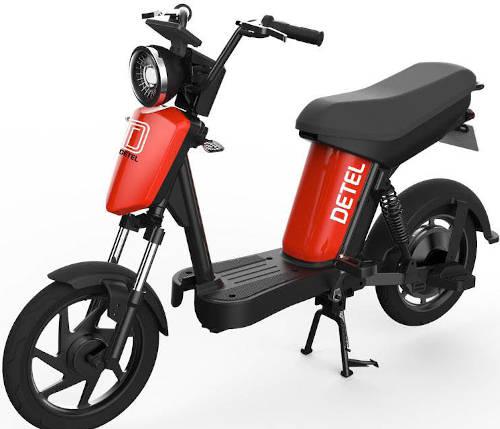
Detel's bikes can be charged at home, claims the company
Detel has been in the market since 2017 with its electronic goods and consumer gadgets. In January 2020, the company entered the EV industry and made an investment of Rs20 crore. The company’s assembly line and R&D unit are in Gurugram. All parts are sourced locally, apart from motors and controllers. “The savings on fuel for the vehicle and maintenance is low as compared to petrol-driven vehicles. Our bikes can be charged at home from any domestic power connection. It is just a matter of time before EV volumes will expand exponentially,” say company officials.
EeVe is an automobile startup with high-speed models in both scooter and bike segments. They are also working on three-wheelers. “The biggest challenge that we are facing is with the mindset of people towards electric vehicles,” explains Harsh Vardhan Didwania, co-founder & director, EeVe India. “Creating awareness among the general public towards motor systems, battery options and build quality has been the key factor to work on. So far there is no investment in this venture. We are outsourcing our vehicle designs. In EVs, the two most critical components are the battery and motor. EeVe is working on developing our own assembly units in both these areas.”
Nexzu Mobility is a leading EV OEM founded in 2015 with the vision of making EVs mainstream in India. With a manufacturing plant at the automotive hub of Chakan, they have over 100 dealer touchpoints, an online store, and a presence across multiple e-commerce portals. Nexzu’s product portfolio consists of e-scooters Dextro and Dextro+ along with newly-launched e-cycles Rompus, Rompus+, Roadlark, and Roadlark Cargo. They provide B2C services and B2B services to other mobility companies in the space of ride-sharing, ride rentals, and also to hyper-local logistics and corporates.
“We have also launched a cargo version of Roadlark, designed for last-mile delivery,” says Rahul Shonak, COO, Nexzu. “The e-cargo carrier also ensures a reduced cost of delivery by 95 per cent with a payload capacity of up to 130 kg, including the rider. It has two batteries, fixed and detachable, and can run at a speed of up to 25 km/h. We are working hard to hit 100 per cent local sourcing. The future of EVs will be championed by localisation, and we are already making this a reality. The dependence on imports is reducing drastically as local manufacturers come to the fore. In fact, Indian manufacturers are now looking to export their products to international markets”, adds Shonak.
-
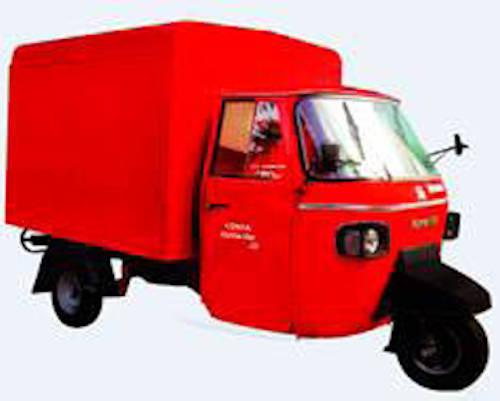
The objective of Lohia Auto is to provide clean, efficient, reliable and affordable city and rural transportation
THREE-WHEELERS
Mahindra’s EV journey, which is more than two decades old, started with ‘Bijlee’. Since then, EVs have been an important part of the business, with a range of passenger and commercial vehicles. There are over 32,000 Mahindra electric vehicles on the roads. The Treo Zor was launched in October 2020 and provides an advanced Lithium ion battery and ease of charging, making it easy for delivery partners to charge the vehicles in various locations. Within six months of launch, the Treo Zor crossed the sales milestone of 1,000 vehicles, with a market share of 59 per cent in its category.
“Treo Zor has been a game-changer for Mahindra and more importantly for our customers who have decided to lead India’s shift towards e-mobility. We are delighted that it has become the preferred delivery vehicle for leading eCommerce players and their fleet operators. We thank all our customers for choosing Treo Zor and enabling us to attain the leadership position in its segment,” says Mahesh Babu, CEO, Mahindra Electric Mobility. Additionally, the Treo range of electric three-wheelers has crossed a sales milestone of 8,000 units and is being sold in over 400 districts across the country.
Piaggio Vehicles Pvt Ltd (PVPL), one of the makers of small commercial vehicles, including the Ape brand, recently launched their FX range (fixed battery) of electric vehicles in both the cargo and passenger segments. The new Ape’ E-Xtra FX is the most powerful electric cargo in the segment with a 9.5 kW power output. It is customisable for applications like the delivery van and garbage collector. The passenger vehicle, Ape’ E-City FX is the most profitable three-wheeler. The FX fixed battery range offers convenience for home and office charging.
The Piaggio Group has a rich heritage of developing electric technology over the last four decades. “Post the launch of Ape’ E-City with swappable technology in 2019, we are now introducing Fixed Battery technology solutions to serve the varied needs of customers. This new FX range is a step in realising Piaggio’s vision which aligns with the government’s initiatives for mass adoption of EVs in India,” says Diego Graffi, CMD, Piaggio Vehicles.
Omega Seiki Mobility (OSM) first showcased its products Rage and Rage+ at Auto Expo 2020. The company’s plant is located in Faridabad. Presently, OSM sells six products – Cargo Rage, Rage plus, Rage Frost, Sun-Ri, E-rickshaw Ride and passenger vehicle Stream. The company will be launching electric two-wheelers by the end of July for the passenger and cargo space. “We are dreamers with focus. We believe that with the right technology, right people and the right alliances, we will achieve our aim,” says Uday Narang, chairman, OSM.
They plan to have about 200 dealerships across the country by the end of 2022 and have ear marked an initial investment of Rs200 crore for ongoing projects and another Rs1,000 crore to fund expansion plans. “OSM is an IoT-enabled company working on batteries, powertrains and whole vehicle architecture. We will be involved in the last mile business, and we are aligning with a lot of large and small, last mile delivery players. We also have a cold storage business,” adds Narang. The company has signed a Memorandum of Understanding (MoU) with New York-based C4V to make solid-state batteries in India.
Lohia Auto is a part of the Rs800 crore conglomerate, Lohia Global with electric two- and three-wheelers. The objective of Lohia Auto is to provide clean, efficient, reliable and affordable city and rural transportation. Lohia’s manufacturing facility at Kashipur, Uttarakhand is managed by modern cloud ERP technology with an annual capacity to manufacture 100,000 vehicles.
“The future of electric vehicles appears bright in India, with a growing demand for electric cargo for transporting goods to various destinations. The EV sector is also coming up with new technologies like battery swapping systems and the installation of more charging stations,” says Lohia on the prospects of EVs in India.
-
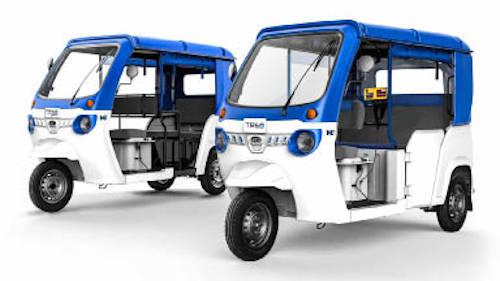
Treo Zor has been a game-changer for Mahindra
Game changer
The Union government recently announced its decision to extend the second phase of the Faster Adoption and Manufacturing of Hybrid and Electric Vehicles (FAME) scheme by two years to March 31, 2024. The scheme started in 2019 for promoting sales of electric vehicles, and was expected to end by the year 2022. This will be a game-changer for EV industry.
Welcoming the government notification to extend the FAME II scheme, Ms Sulajja Firodia Motwani, Chairperson, FICCI Electric Vehicle Committee said, “Continuation of FAME II scheme will help the industry in capturing the deferred demand for electric vehicles (EV), with the support of the scheme. The demand for EVs was severely affected due to pandemic and industry was really looking forward to the extension of FAME II scheme by few more years so that the amount allocated under the scheme could be deployed to accelerate demand for electric vehicles.”
Under the Gujarat EV Policy 2021, the state government will provide subsidies up to Rs20,000 on electric two-wheelers, Rs50,000 on electric three-wheelers, and R1.50 lakh on electric four-wheelers. Buyers will not be charged a registration fee for their electric vehicles at any RTO in Gujarat. According to the rating agency, ICRA, the incentives under this policy, coupled with enhanced subsidy under the Centre’s FAME-II scheme will lead to a price reduction of electric two-wheelers by around Rs30,000 in the state. These positive steps should help bring more buyers towards EVs.
Steps for EV success
Going forward, there are several issues to be resolved before EV success in India. The electric movement has started, but to take it forward, continued support from both central and state is crucial. A strong financial support mechanism is still missing in the country. Only a few banks offer loans for electric vehicles. Creating awareness regarding green vehicles will be an important factor to transform the mindset of the consumers towards the EV industry.
India’s e-commerce logistics is another potential sector for cargo vehicles. Amazon and Flipkart have announced that they will be deploying EVs for the delivery of goods. Most importantly, there is a need to create an infrastructure with charging stations across the country to help push sales of EVs. The EV ecosystem will provide a great business opportunity for new players to enter the segment.









































